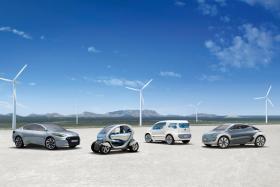

The Renault-Nissan Alliance wants to make it easier for people to switch to zero-emission vehicles. The Alliance aims to help policymakers and civic leaders worldwide understand the technological, political and environmental benefits of EVs.
EVs are more efficient than internal combustion engines, but many governments are interested in them for another reason: EVs do not rely on a single, non-renewable resource and, unlike gasoline-powered cars, can be refuelled using nearly any type of fuel – from nuclear and natural gas to solar, wind, hydroelectric and geothermal energy. That means that EVs can help oil-importing countries reduce their reliance on gasoline -- and develop local energy resources.
Reducing reliance on petroleum is a key reason so many governments have created incentives to encourage consumers to buy cleaner cars. Click here for a list of incentives by country.
While government-led incentives have been a great way to kick-start the EV revolution, the auto industry is already planning for a time when the financial incentives will have vanished, said Tracy Woodard, Director of Government Affairs at Nissan North America, who spoke this week at the Electric Vehicles Summit in Los Angeles.
Many government agencies provide incentives that are not simply cash rebates. For instance, American EV owners in the state of Washington don’t pay state sales tax on a purchase release of an EV, and in the US state of Arizona they don’t pay a registration fee for electric vehicles.
Other regions offer intriguing non-financial incentives, such as allowing EVs to use high-occupancy lanes when only the driver is on board. (Most high-occupancy vehicle lanes are for buses or taxis, or cars with three or more people in them, making them illegal for the average commuter.)
Free on and off-street parking for EVs is another common incentive.
“Anything that removes a barrier and makes it more appealing for people to obtain these cars is helpful,” Woodard said. “ It gets us from early adopter to the next larger group of people that we want to see purchase or lease these cars.”
print Tweet